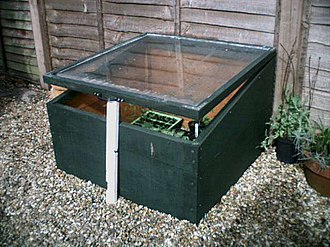Difference between revisions of "AY Honors/Hotbed cold frame/es"
(Created page with "'''Cold Frame''' (cubierto con vidrio)") |
(Created page with "thumb|''Un semillero tradicional cubierto con vidrio hecho en casa'' En agricultura y jardinería, un '''semillero cubierto con vidrio''' es un recin...") |
||
| Line 6: | Line 6: | ||
'''Cold Frame''' (cubierto con vidrio) | '''Cold Frame''' (cubierto con vidrio) | ||
| − | [[Image:Coldframe 1.jpg|thumb|'' | + | [[Image:Coldframe 1.jpg|thumb|''Un semillero tradicional cubierto con vidrio hecho en casa'']] |
| − | + | En agricultura y jardinería, un '''semillero cubierto con vidrio''' es un recinto con techo transparente, construido cerca del suelo, que se utiliza para proteger las plantas del clima frío. La parte superior transparente admite la luz del sol y se basa en el efecto invernadero para reflejar el calor radiante que de otro modo se escaparía por la noche. Esencialmente, un semillero cubierto con vidrio funciona como un dispositivo de extensión de temporada de invernadero en miniatura. | |
Cold frames are found in home gardens and in vegetable farming. They create microclimates that provide several degrees of air and soil temperature insulation, and shelter from wind. In cold-winter regions, these characteristics allow plants to be started earlier in the spring, and to survive longer into the fall and winter. They are most often used for growing seedlings that are later transplanted into open ground, and can also be a permanent home to cold-hardy vegetables grown for autumn and winter harvest. | Cold frames are found in home gardens and in vegetable farming. They create microclimates that provide several degrees of air and soil temperature insulation, and shelter from wind. In cold-winter regions, these characteristics allow plants to be started earlier in the spring, and to survive longer into the fall and winter. They are most often used for growing seedlings that are later transplanted into open ground, and can also be a permanent home to cold-hardy vegetables grown for autumn and winter harvest. | ||
Revision as of 18:05, 15 October 2020
Hotbed (Semillero con calor)
Un semillero con calor es una pila de materia orgánica en descomposición más caliente que su entorno debido al calor que desprende el metabolismo de los microorganismos en la pila en descomposición. Los semilleros se utilizan para compostar y mantener calientes las plantas delicadas durante el invierno.
Cold Frame (cubierto con vidrio)
En agricultura y jardinería, un semillero cubierto con vidrio es un recinto con techo transparente, construido cerca del suelo, que se utiliza para proteger las plantas del clima frío. La parte superior transparente admite la luz del sol y se basa en el efecto invernadero para reflejar el calor radiante que de otro modo se escaparía por la noche. Esencialmente, un semillero cubierto con vidrio funciona como un dispositivo de extensión de temporada de invernadero en miniatura.
Cold frames are found in home gardens and in vegetable farming. They create microclimates that provide several degrees of air and soil temperature insulation, and shelter from wind. In cold-winter regions, these characteristics allow plants to be started earlier in the spring, and to survive longer into the fall and winter. They are most often used for growing seedlings that are later transplanted into open ground, and can also be a permanent home to cold-hardy vegetables grown for autumn and winter harvest.
Cold frame construction is a common home or farm building project, although kits and commercial systems are available. A traditional plan makes use of old glass windows: a wooden frame is built 30-60 cm![]() , and the window placed on top. The roof is often sloped towards the winter sun to capture more light, and to improve runoff of water, and hinged for easy access. Clear plastic, rigid or sheeting, can be used in place of glass. An electric heating cable, available for this purpose, can be placed in the soil to provide additional heat.
, and the window placed on top. The roof is often sloped towards the winter sun to capture more light, and to improve runoff of water, and hinged for easy access. Clear plastic, rigid or sheeting, can be used in place of glass. An electric heating cable, available for this purpose, can be placed in the soil to provide additional heat.

